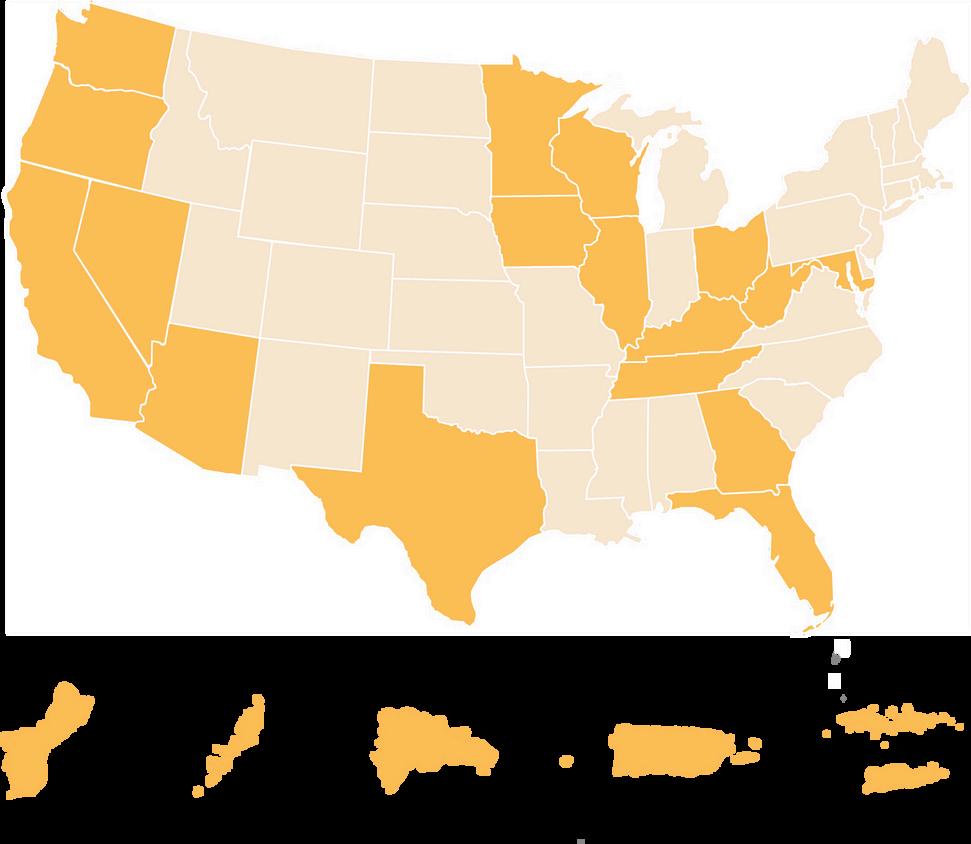THE ORIGINS OF WESTCARE ILLINOIS & WESTCARE IN MARYLAND









By Rebecca Hernandez, Creative Services Manager, WestCare Marketing & Communications
The wind swept across the vacant lot, kicking up dust where the towering walls of a housing project once cast its long shadow By the early 2000s, Chicago bore the scars of over a century of separation and division amongst its residents; not only physically, but economically, geographically, racially, and socially.
But this space wasn't always empty It once stood at the center of a bustling community, born out of a mid-20th century federal housing policy that sought to shelter an influx of families comprised of war-industry workers arriving from the South and returning soldiers after World War II Ultimately, these neighborhoods spiraled into ghettos when middle-income white families took advantage of their mobility to move to the newly emerging suburbs, leaving other historically marginalized communities behind
Milestones in WestCare Illinois’ History
Sheridan reopens as a Therapeutic Community, marking a significant shift from its past as a facility plagued by violence and gang activity.
Sheridan Correctional Center, long known as the "Thunderdome" for its gang violence and daily power struggles, closes down due to escalating violence and safety concerns.
This exodus, historically referred to as a “white flight,” was accompanied by redlining, a set of coordinated, discriminatory real estate practice that denied Black citizens of Chicago access to residential mortgage loans in specific neighborhoods, further isolating them from economic opportunities and restricting their access to resources essential to a vibrant community As a result, the housing projects that once promised hope instead became symbols of concentrated poverty, riddled with crime and violence
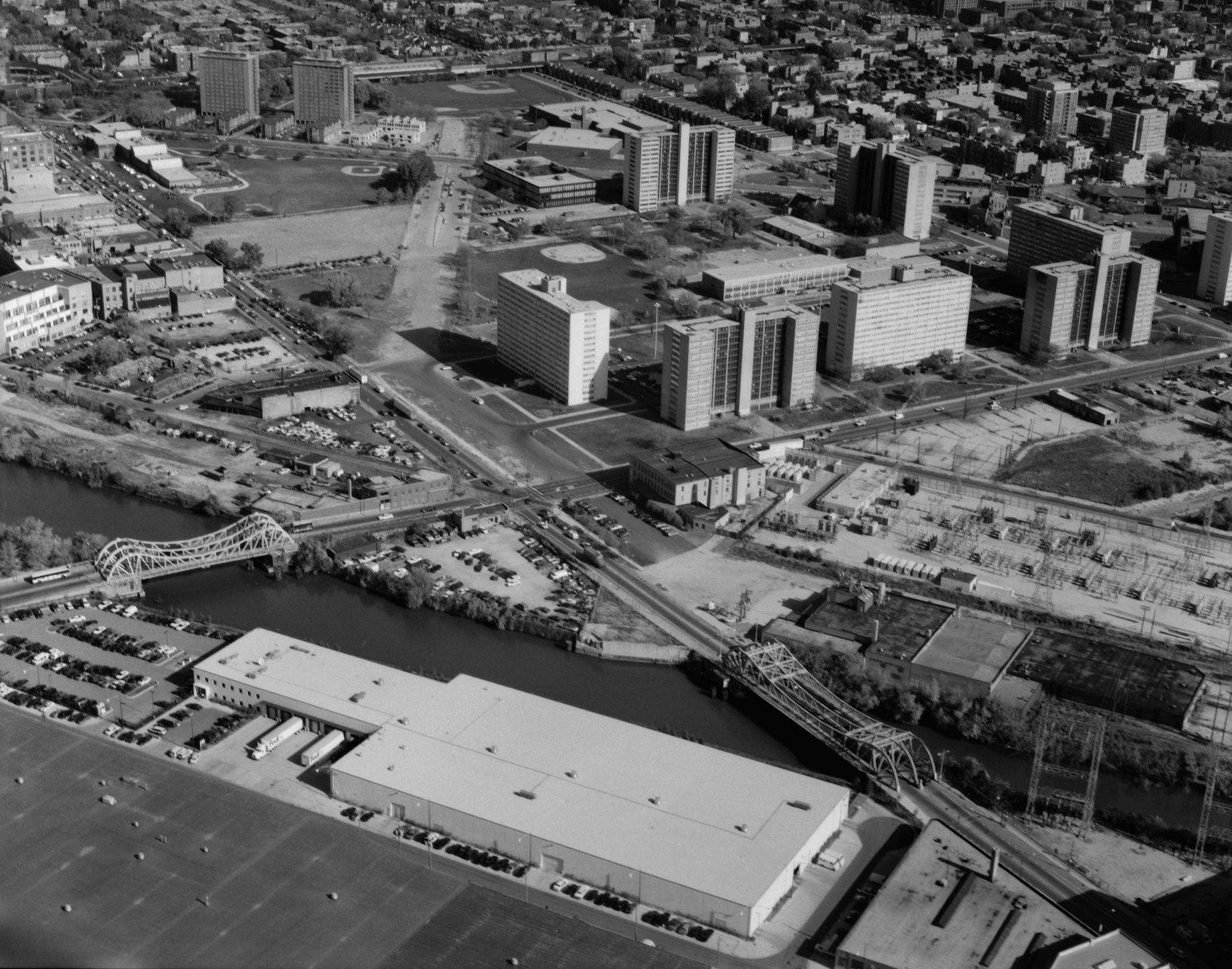
Although redlining was finally outlawed in 1968, it continued to shape the racial, social, and economic landscape of Chicago well into the 1980s Entire neighborhoods became further isolated, lacking access to basic amenities like grocery stores, well-funded schools, and accessible healthcare The fallout from these practices created an environment where generation after generation was born into poverty with few opportunities for success
WestCare officially wins the contract, securing its role in managing the rehabilitation and treatment programs at Sheridan Correctional Center.
Sheridan Project goes up for bid. Dick Steinberg, Bob Neri, and
come to Sheridan.
WestCare began offering treatment services in Cook County Jail, focusing on substance use and mental health support to help incarcerated individuals prepare for reintegration and reduce recidivism.
The outpatient office in Chicago opened in the Pilsen neighborhood, where it began collaborating with several community partners to provide vital services and support to the local population.
In the late 1990s, the city began demolishing the housing projects, promising new opportunities for displaced families, but instead of being welcomed into new neighborhoods, many found themselves facing different challenges as government aid like Section 8 was insufficient to combat systemic racism in suburban housing markets. “So, now you’ve got individuals who, generationally, have not had access to wealth or education, being displaced and further disfranchised as their communities are dissolved and their political power is now diluted,” explained Sean Hoyer, former Area Director of WestCare’s Chicago Community Programs At least the communities in the projects had offered mutual aid, but this forced diaspora destroyed their social support systems These layers of systemic racism and displacement contributed to a growing cycle of poverty, trauma, and incarceration with many of Chicago's displaced residents finding themselves ensnared in the criminal justice system as a result of the “War on Drugs ”
When WestCare came to Illinois in 2006, it was by way of the Sheridan Prison Project “Illinois was doing an experiment at the time and the experiment was to turn an entire prison into a Therapeutic Community (TC),” explained Richard “Dick” Steinberg, President of WestCare “It was a great experiment - everybody that was there was part of this TC and the state put it out to bid.” WestCare sent out a review team including Dick Steinberg; Bob Neri, WestCare’s Chief Privacy Officer; and Shawn Jenkins, Chief Operations Officer for WestCare’s Western Region “They did a walk through and gave a presentation for our review group to win the contract,” remembered John Nunley, WestCare’s Vice President of Corrections and Criminal Justice/ Business Development John, at the time, was the Assistant Warden of Operations at Sheridan “What drew me to Dick was his emotional response to what we were doing and the opportunity to be involved with it I’ll never forget that,” he said
Illinois, as a historic hub of immigration, industry, and transportation, has long been known for its influential labor unions, which played a pivotal role in shaping the state’s workforce and labor rights “Unlike anywhere else in the
continued on page 4
Outpatient Treatment begins at Cook County Detention Center with licensure by the State to deliver outpatient SUD services.
WestCare expanded to Crossroads Adult Transition Center (CATC), a minimal-security facility focused on community reintegration, where they provided staffing and support

The Women of Dignity program at Logan Correctional Center, led by WestCare since 2015, offers a lifeline of recovery and rehabilitation for incarcerated women With a 130-bed capacity, this gender-specific treatment program helps participants address substance abuse issues through evidence-based practices such as the Matrix model, Cognitive Behavioral Therapy (CBT), and 12-step groups
Women enter a therapeutic community where they take on roles within structured crews -ranging from service tasks to creative projects, education, and peer support The program emphasizes personal growth, leadership, and mentorship through its "Big Sister" initiative, where women who have made strides in their own recovery guide newer participants
Assistant Program Director, Glodonna Trimby, shares that one of the most rewarding aspects of her job is watching women realize their own potential and reclaim their lives "Seeing that moment when it clicks for them, when they understand what recovery can offer, is incredibly fulfilling," she says
Through its holistic approach, Women of Dignity empowers participants to heal, not just from addiction, but from the trauma and challenges they’ve faced, fostering growth and hope for the future
Medicaid Blue Cross Blue Shield became the first of five Managed Care Organizations to contract with WestCare, following the organization's licensure by the state to deliver outpatient SUD services.
The Dixon Springs Impact Incarceration Facility and the Du Quoin Impact Incarceration Program both opened as bootcamp-style programs.
In 2015, WestCare expanded with programs at both Logan and Lincoln Correctional Centers. At Logan, they launched the Women of Dignity program and the Dual Diagnosed Treatment Program for co-occurring disorders, while at Lincoln, they introduced a men's treatment program, broadening their impact across Illinois.
WestCare opens the only juvenile program at the Illinois Youth Center (AKA “Baby DOC”) in the state.
WestCare world, all of the workers at Sheridan, both in the program and the prison were Union Workers ” Dick said This marked WestCare’s first experience negotiating with a labor union, but in true WestCare fashion, the partnership proved mutually beneficial WestCare not only adapted to the union environment but also embraced it as an opportunity to learn, enhancing its employee development practices and gaining valuable insights from the unionized workforce This collaborative approach strengthened both WestCare and the Union, fostering a culture of excellence through work-life balance, professional growth, and continuous training “I remember from the side of being Department of Corrections (DOC), WestCare always being a company with a good soul and a good heart Anytime you bring in employee advocates, the agency can learn ” John Nunley noted
At one point, Illinois elected a new Governor, and the state considered reducing the number of treatment beds at Sheridan. However, a study conducted by Dr. Dave Olsen at Loyola University changed the trajectory of the program His research demonstrated that the TC model not only worked but saved the State money by significantly reducing recidivism rates The data was so compelling that the state ended up increasing the number of beds "We were concerned about being kicked to the curb, but they came to us and said, ‘we could double the size of the population if you’re up to it ’ So we went from 850 beds to 1600 overnight,” Dick remembered
The success of the program at Sheridan was undeniable, but the need for a continuum of care became increasingly clear. Many who left the program returned to neighborhoods struggling with all the same problems “People were returning to what were essentially war zones The neighborhoods were very violent, and there was a lack of connection between resources It was not coordinated at all,” remembered John Nunley It was evident that support was desperately needed beyond the prison walls.
Began providing prevention services after being awarded the SAMHSA Partnerships for Success – Strategic Prevention Framework (PFS-SPF) grant.
Outpatient treatment by Chicago Community Services at Cermak location begins.
WestCare secures a treatment contract in Decatur to provide care for individuals with dual diagnoses.

Community Services Building in Chicago’s Pilsen Neighborhood
To help address this, WestCare expanded its reach by opening an office on the southwest side of Chicago in 2009 This move was essential not only to providing ongoing support for individuals reentering society, but also to fostering a more connected community by maximizing the impact of local agencies and connecting their efforts. As Sean Hoyer explained, “It’s not just about providing services for guys coming out of prison – it’s about asking, ‘How can we invest in the community? How do we change the dynamics of these neighborhoods? How can we fix what is going on?’” The programs WestCare offers, in partnership with other community organizations, help to sustain recovery and empower these neighborhoods to thrive.
In fact, WestCare’s vision for creating lasting change through their community programs in Chicago extends beyond intervention services delivered directly to clients Rather, they aim to foster connectedness and resilience in those same communities that were so fractured by systemic issues like segregation, poverty, and violence by partnering, mentoring, and empowering other local agencies “Our goal is that within five years, the agencies we mentor can stand on their own as primary prevention organizations serving their communities,” explained Sean Hoyer
WestCare was awarded a contract to provide transition services for youth reuniting with their families after Illinois Department of Juvenile Justice incarceration.
WestCare received a grant to offer MedicationAssisted Recovery services to justice-involved individuals.
WestCare begins operations at the Murphysboro Lifestyle Redirect Reentry Center, providing support and services for individuals reentering the community.
Began providing Workforce Support services after being awarded the SAMHSA grant.
By investing in the success of other organizations, WestCare creates a ripple effect of connectedness and empowerment
This collaborative approach helps to ensure that community resources are more integrated, giving residents easier access to the support they need.
The years that followed saw WestCare expand both its correctional and community-based programs in Illinois By 2013, a grant known as Adult Redeploy and another from Chicago Community Trust officially kicked off outpatient services in the Windy City. The Adult Redeploy grant helped implement the Access to Community Treatment (ACT) Court This ACT Court serves people who are at high risk of reoffending and fits perfectly into WestCare’s vision for a continuum of care that supports individuals who are within institutions, returning to communities, and those who are in diversion programs
In 2015, WestCare launched the Women of Dignity program at Logan Correctional Center, located in the heart of Illinois The program specifically targeted general population inmates with co-occurring mental health and substance use disorders This initiative underscored WestCare’s commitment to addressing the complex needs of any and all within their care.
In 2017, operations at the Illinois Youth Center (IYC) in Harrisburg began Here, the idea was to emphasize early intervention, aiming to break the cycle of incarceration by addressing the underlying issues of substance use, and mental health that often led to criminal behavior By offering structure support and educational opportunities, the program sought to equip these youth with the skills and resources necessary to reintegrate into society and build brighter futures
Today, WestCare remains focused on creating a lasting impact in Chicago. Through its work in both corrections and the community, the organization is committed to addressing the root causes of incarceration - poverty, systemic racism, and lack of access to resources “From a correctional standpoint, we are sending back returning citizens better, who can help their communities heal and move forward,” said John Nunley WestCare’s holistic, connected approach continues to advance its mission of Uplifting the Human Spirit and helping reshape Chicago into a city where all individuals have the opportunity to thrive



Scan or click here to learn more about WCIL

In 2017, Lydia Shepard began a paid internship with WestCare Illinois (WCI) through Centers for New Horizons, a nonprofit that supports families and communities Lydia’s IT background proved invaluable in her role as an administrative assistant. Though her internship lasted just three months, she made a lasting impression on WCI
Three years later, while working elsewhere, Lydia received a call from Yolanda in WCI’s HR department about a position she’d be perfect for She applied, and soon after, joined WCI as the research assistant and lead epidemiologist for the SAMHSA Partnership for Success (PFS) grant, which focuses on preventing substance use among at-risk youth in alternative schools
Lydia’s role is vital She assesses clients enrolled in PFS and ensures they are connected to the support services they need, ranging from housing assistance to career guidance Her commitment goes beyond the job she stays in touch with many of her clients long after they’ve completed the program, offering support whenever needed.
“Lydia goes above and beyond for our participants and their families,” says Carlos Rodriguez, Area Director of WestCare’s Chicago Community Programs “She’s always finding ways to meet their needs, whether it’s helping a single mom find diapers or assisting a student with their resume ”
The PFS program employs the 7 Challenges curriculum, addressing underlying issues such as trauma and mental health, while helping participants develop life skills like critical thinking and problem-solving Lydia highlights the team approach, noting that WCI works closely with community organizations to ensure participants have the resources to move forward, regardless of past struggles
Lydia’s passion for helping young people started during her college years at Chicago State University, where she tutored and mentored students in after-school programs Today, she continues that legacy at WCI, where she remains dedicated to transforming lives through her work
By Rebecca Hernandez, Creative Services Manager, Marketing & Communications

By 2021, Maryland found itself in the grip of an opioid epidemic so devastating, it felt as though no community was untouched. Thousands were forced to say goodbye to their brothers, sisters, fathers, mothers, daughters, and sons - lives cut short by overdose Since 2011, the number of families shattered by this loss had quadrupled
The rising number of drug-related deaths became increasingly concerning for those who lived in The Old Line State. The issue was compounded in 2016, when Suboxone was removed from the Medicaid Preferred Medication list due to concerns about smuggling and use in prisons This change made it more difficult for individuals outside the correctional system to access
Milestones in WestCare Maryland’s History

opioid addiction treatment At the same time, Maryland’s correctional facilities lost their previous addiction treatment services provider, leaving those incarcerated, many of whom were most vulnerable to addiction, without the essential treatment they desperately needed
In 2017, Maryland declared a state of emergency, funneling millions of dollars into prevention and treatment efforts, but with no system in place in the correctional system, help remained out of reach for those behind bars and many who were released during this time period Due to bureaucratic delays the money that had been set aside by the state was never put into play, leaving many who had been released from prison without access to the addiction treatment services they desperately needed This exacerbated the recidivism rate,
Since 2015, the number of deaths due to overdose had doubled, highlighting the escalating crisis and the urgent need for prevention and treatment strategies.
Removal of suboxone film strips from the Medicaid Preferred Drug List, making it harder to access this crucial treatment for opioid addiction. REMOVAL OF MEDICINE
State of Maryland issues a request for proposals for a treatment provider; John Nunley goes to Maryland.
In response to the growing overdose crisis, House Bill 116 passed, aimed at enhancing support for addiction recovery services and expanding access to treatment.
WestCare steps in to fill the void left by the lack of support, taking on a vital role when the State awards the bids for addiction recovery services.
as individuals were left vulnerable to relapse and rearrest
House Bill 116 (HB116) was introduced in January of 2019, and passed the following April The bill required Maryland’s correctional facilities to offer medication assisted treatment (MAT), specifically to help tackle the opioid use disorder in incarcerated populations This bill paved the way for future MAT programs, and the gap of services since 2016 highlighted the desperate need for services, and the urgency for solutions like WestCare’s approach
By 2021, the state of Maryland issued a request for proposals, seeking providers to deliver therapeutic and recovery services in its correctional system John Nunley, WestCare’s Vice President of Corrections of Criminal Justice/Business Development, took notice and visited the sites in late July of that year With four regions available, WestCare strategically chose to focus on threeWestern Maryland, Central Maryland, and the Eastern Shore - to ensure that WestCare's services would have a sustainable and meaningful impact across the state This decision allowed WestCare to provide comprehensive care and foster long-term recovery for incarcerated individuals throughout Maryland
The journey to securing the contract wasn’t a solo endeavor and while John Nunley played a critical role in assessing the viability of Maryland's correctional facilities, he wasn’t alone Behind the scenes, the proposal was the result of a collaborative effort Cecily Moreland, WestCare’s Grant Development Officer, worked diligently on the bulk of the proposal, ensuring every detail was in place Dr. Jason Engel, WestCare’s Chief Clinical Officer, also contributed by handling the footwork to ensure that WestCare qualified to apply for the bids, making their team effort instrumental in securing WestCare’s path forward in Maryland
Opens first male therapeutic community program at Maryland Correctional Training Center (MCTC).

In April 2022, WestCare was officially awarded all three regions they bid for and stepped in to fill the void A national leader in therapeutic recovery, WestCare had the simple but powerful goal of Uplifting the Human Spirit by helping justice involved individuals struggling with opioids, to break the cycle
The first step in the process was establishing comprehensive screening and assessment services Clients initially undergo the Texas Christian University Drug Screen 5 (TCU5), a tool designed to assess the severity of substance use disorders. If the individual meets the criteria, they move on to the Treatment Assignment Protocol (TAP) assessment, which further evaluates their treatment readiness and specific needs “If they score high enough on the assessment that they
continued on page 8
Plans for expansion to Eastern Correctional Institution (ECI)
Opens first female therapeutic community program at Patuxent Institution for Women (PIW).



need a 3 5 level of care, meaning high intensity treatment, that’s the individuals that we would place into the therapeutic community,” explained Stephen Wright, WestCare’s Chief Operating Officer of the Eastern Region This structured approach sets the stage for successful recovery
In August of 2023, WestCare in Maryland (WCMD) opened its first male therapeutic community (TC) at the Maryland Correctional Training Center (MCTC) in Hagerstown “We started with 45 individuals in the first cohort, and the program runs for six months Our goal is to eventually expand the therapeutic community in Hagerstown to accommodate 96 participants ” Dr Engel explained about the program at Hagerstown Participants engage in 36 hours of structured programming each week, focusing on therapy, recovery, and personal development to support their recovery journey
A year later, WCMD launched its first female therapeutic community program in the state at Patuxent Institution for Women (PIW) in Jessup The program started with 12 women, and will expand to as many as 48 at a time. “We will get an additional cohort every sixty days until we are at capacity,” Dr Engel noted
As part of Maryland's comprehensive approach to treating opioid use disorders in accordance with HB116, a medical vendor provides the Medication-Assisted Treatment (MAT) services, while WestCare Maryland delivers the accompanying Medications for Opioid Use Disorder (MOUD) counseling This partnership ensures that individuals not only receive the necessary medical treatment but also therapeutic support to guide them through their recovery journey
A 48-bed male TC is scheduled to open at Patuxent





At WestCare, we are proud to be actively serving in eight locations across Maryland, providing essential support and services that uplift and empower those in need. As part of our long-term vision, we will be extending our services to all 16 locations included in the original Request for Proposals (RFP), ensuring that more individuals across Maryland have access to the care and resources they deserve. Together, we are building a brighter, healthier future for all.
Dr. Engel & Mr. Wright at Patuxent Institution
Institution (PI) in February 2025 “We are excited to serve both men and women in the form of therapeutic communities in the Jessup area,” Stephen Wright noted.

WestCare’s entry into Maryland’s correctional system marks a pivotal shift toward recovery and rehabilitation Maryland found a vital partner in WestCare to address the growing need for addiction treatment "Our partnership with Maryland represents more than just service delivery it’s about creating lasting change. Together, we’re building a system that not only addresses the challenges of addiction but also empowers individuals to reclaim their lives,” said Stephen Wright The integration of therapeutic communities and MOUD programs offers a comprehensive solution to reduce recidivism and support recovery, all while staying true to WestCare’s mission of Uplifting the Human Spirit







By Dustin Forman, Director of Community Engagement

On Saturday, August 17th, staff from WestCare The Village South accompanied a group of our residential clients to the Miami Dolphins Recovery Day game against the Washington Commanders. The clients participated in a sober tailgate event organized by the Miami Dolphins and attended a recovery meeting before taking their seats to cheer on the Dolphins in their 13-6 win. The clients provided overwhelmingly positive feedback, expressing a sense of belonging to a community----a recovery community----comprised of individuals who have faced or are facing substance use disorder. This supportive environment highlighted the significance of such a community in their ongoing path to recovery.
By Dustin Forman, Director of Community Engagement
WestCare The Village South (TVS) has partnered with Business for the Arts of Broward to enhance our residential facility with art. Recognizing the power of art to Uplift the Human Spirit, we aimed to create a welcoming environment for our clients on their recovery journey. Through our collaboration with Business for the Arts of Broward, we have added multiple pieces of art to our facility. We are grateful for their partnership, organization, and the ease they brought to the process, including the installation of the artwork.
Business for the Arts of Broward offers numerous opportunities for community engagement, including but not limited to:

Art & Stroll: An event that transforms the Las Olas business district for one unforgettable night with art, entertainment, and culture.
Art in the Workplace: An innovative program promoting arts awareness, involvement, and employee enrichment at work. It encourages individuals to step out of their daily routines, explore new thought processes, and engage in creative problem-solving. This program bolsters team building, mental health, and wellness, and can be customized to meet specific business needs and objectives.
Arts Mean Business: A lecture series with intimate lectures featuring nationally and locally acclaimed speakers who share their personal experience, inspiration, and artistic journey.
Scan or Click Here to Learn More about - WestCare The Village South!




By Airika Lih Actouka, Community Outreach Coordinator
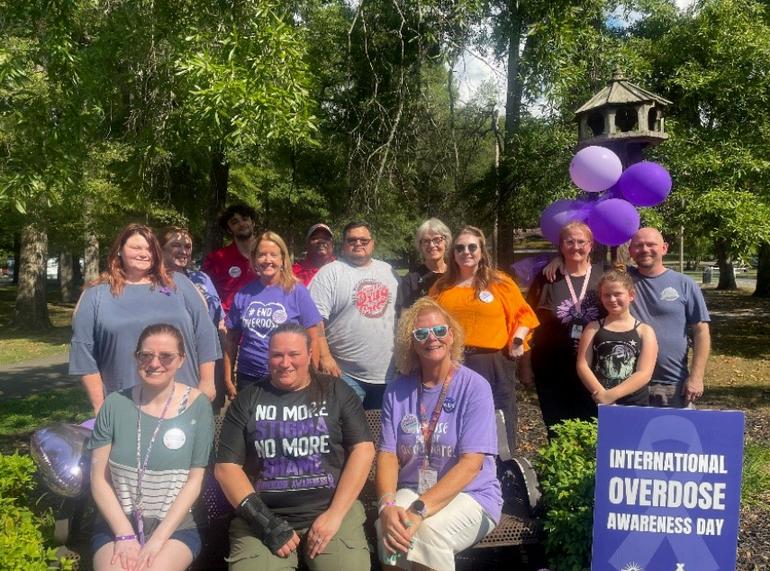
WestCare Tennessee celebrated International Overdose Awareness Day on August 31, 2024 with a community awareness event at Newport City Park in Newport, TN. Organized by Sydney Jernigan, Project Director of Strategic Prevention Framework (SPF), the event began with community resource sharing from WestCare Tennessee, Sevier County
C.A.R.E.S. and the Sevier County Office of Alcohol and Drug Programs, Creekside Behavioral Health, and Celebrate Recovery.
After an introduction and prayer, Sydney Jernigan read Cocke County Mayor Rob Mathis’ proclamation of August 31, 2024 as International Overdose Awareness Day in Cocke County.

Attendees enjoyed a meal prepared and served by WestCare Tennessee and community volunteers with fruit provided by a community partner. Candles were lit at the Memorial Table in loving memory of those that could not be with us today, but are forever in our hearts. Finishing the event, participants went on a remembrance walk in honor of those lost to overdose.

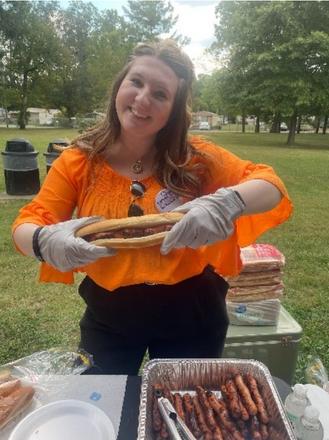


Scan or click here to learn more about WCTN!
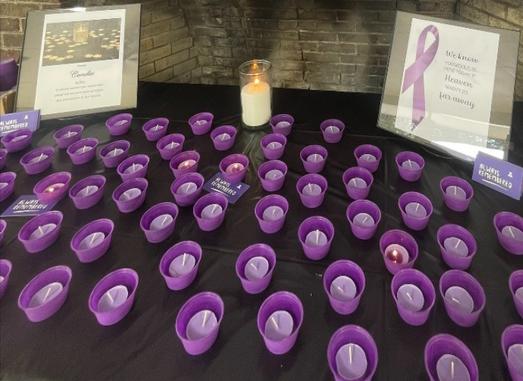
By Felicia Williams, Regional Administrator
On Saturday, August 31, 2024, our WestCare Wisconsin Credible Messenger team, Administrative Staff, and a group of young ladies from our program had the pleasure of attending the 8th Annual Divas Brunch. This wonderful event is hosted by The JazzyRae' Legacy Foundation (JLF), an organization founded by JohnRae' Stowers in memory of her mother, the late Pastor Petria A. Diggs-Scott The JazzyRae' Legacy Foundation is an extension of JazzyRae' Jewels and Accessories, a Milwaukee-based boutique dedicated to community engagement, networking, and empowering women.
JLF operates with four key pillars: commitment to education through scholarships and mentorship, empowerment of women, cancer awareness, and intentional community impact. We were honored to be part of an event that aligns with our own mission of Uplifting the Human Spirit and supporting positive change in the community.
In preparation for this special occasion, the young ladies in our program received etiquette training from Dana World-Patterson to ensure they felt confident and comfortable in this new setting.
It was a fantastic event, and we are so proud of our team and the young ladies for their participation. Great job, everyone!


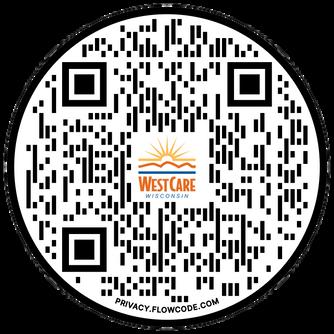

Scan or click here to learn more about WCWI

In celebration of 50 years of Uplifting the Human Spirit, The Express is embarking on a journey through time. Over the next year, we will feature the origin stories of two entities every month, tracing our history in semi-chronological order. Join us on this extraordinary odyssey of discovery and inspiration.
Our commitment to showcasing the incredible work that makes WestCare a beacon of healing and support in our communities remains steadfast. While we are featuring the history of WestCare, we will continue to feature highlights from the remarkable journeys of individuals and groups who inspire us all. We urge you to continue to submit your stories of success, education, prevention, and healing to marketing@westcare.com. Your narratives fuel hope and contribute to our collective mission of Uplifting the Human Spirit.





